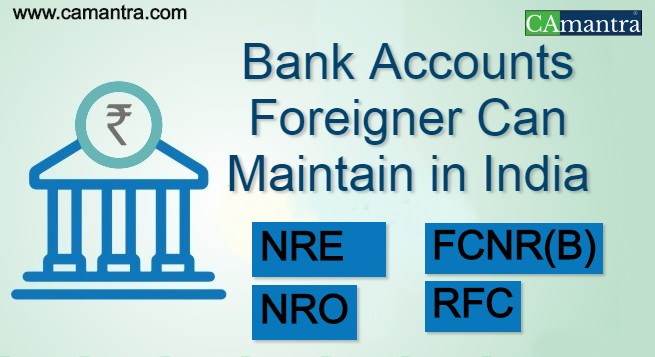NRIs (Non-resident Indian) / PIOs (Persons of Indian Origin)/ OCBs (Overseas Corporate Body) are permitted to open bank accounts in India.
If you are a non-resident Indian (NRI) or PIO the first thing you need to do is have the right bank account to manage your money. Like regular citizens of India, NRIs cannot have standard savings accounts in Indian banks.
These kinds of Bank account maintained by foreigner in India:
- Non – Resident External Rupee Account (NRE).
- Non- Resident Ordinarily Account (NRO).
- Foreign Currency Non-resident (Banks).
- Resident Foreign Currency (RFC) Account
1. Non-Resident Ordinary (NRO) – This is the savings bank account of the NRI, which can be funded in foreign exchange or rupees. NRO bank accounts can be opened either by money received from abroad in foreign exchange or out of rupees earned in India. When an Indian resident goes abroad for job his/her local account will automatically be designated into a NRO account by bank. Funds kept in the account can normally be utilized only in India. NRO accounts can be maintained in many forms such as saving account, fixed deposit, recurring deposit account, etc.
2. Non-Resident External (NRE) – The NRE account can be opened only with money received from abroad and not from local rupee sources. There can be joint holder but the joint account holder should be a non-resident too not a resident. The funds held in the account can be freely repatriated outside India without limit & approval from RBI. Beause the account is maintained in rupee, for repatriation purpose the Rupee will be converted into the desired foreign currency at the prevailing rate of exchange.
The main difference in NRE from the NRO account is that this account needs to be funded only in foreign currency. The recurring & fixed deposit must have a minimum maturity period of 1 year. For opening a NRE account; the NRI account holder need to open this account on his own and cannot use Power of attorney to open an NRE account
Earned Interest on the account is income tax free. The account can be maintained as these options like savings bank account, fixed &recurring deposit, etc. The fixed deposit account should be for a minimum period of 1 year and for a maximum period of three years.
3. Foreign Currency Non-resident (Banks) – Opening an FCNR (B) account is similar to opening a regular fixed deposit. Foreign Currency Non-resident Accounts are term deposit accounts. They can be maintained in 4 currencies:
- US Dollar,
- Pound Sterling, and
- Japanese Yen
- Euro
They can be maintained for period ranging from 1to 3 years.
The FCNR (B) account is maintained in foreign currency and paid back in the same currency too. Thus, there is no currency conversion when amount is repatriated outside India.
4. Resident Foreign Currency (RFC) Account- Resident Foreign Currency account is generally useful for those who are returning NRIs to deposit their foreign currency in India. The RFC account is also maintained only in a Foreign Currency. This account can be held as a term deposit account & savings account both.
The amount from RFC account can be withdrawn when necessary but interest will be paid only if the amount is held for more than one year. Indian currency cannot be deposited in the RFC account.
In India, The interest earned from the funds is taxable. But if an individual is a returning NRI and have the RNOR status, then he/she can exempt from tax for the 2 year period with RNOR status. You can transfer funds from your NRE account or FCNR account if you decide to become a Resident.
The deposited funds can be transferred to NRE account or FCNR account if you want to become an NRI again. The interest earned by the funds in RFC account is entirely repatriable. You cannot take any loan against the deposits in the RFC account.
Why should Foreigner have an NRO account?
NRO accounts are savings /current accounts which can be used by NRIs to manage their income which is earn in India. This account holds currency in Rupees only. You can also utilize your NRO account to directly invest in MF (Mutual Fund) and shares.
The money in NRO accounts is not freely repatriable, so the best suggestion that you use this account for local spends. You can even go for an NRO FD, especially if you’re not planning to use your accumulated funds anytime soon. This may help you make good interest on savings.
Keep in mind that any interest that you earn in an NRO account will have 30% plus surcharge (if any) and cess, as TDS levied on it. However, if your country of residence is a part of the Double Tax Avoidance Agreement (DTAA), then you can avail a lower rate of TDS; you will need to complete some formalities & submit documents as prescribed by the RBI to do this.
DTAA is a tax treaty signed between two or more countries to help taxpayers for avoiding double taxes pay on the same income.
Why should Foreigner have an NRE account?
As described earlier, NRO accounts are not freely repatriable. But for many NRIs repatriation of funds is a critical need. The ability to freely repatriate funds outside India in any currency, and the fact that interest earned on NRE accounts is free from tax, make this bank account very popular in the NRI community.
There are a few limitations though. The foreign currency is converted to Indian currency, and thus subject to currency fluctuations. An essential point to note is that any income earned in Indian currency cannot be deposited to an Non – Resident External Rupee Account. But an individual can freely send funds from their NRE account to any other NRE account in India, or transfer them to a foreign account.
Why should Foreigner open an FCNR account?
The major benefit of operating an FCNR account is that these accounts can be maintained in a currency other than Indian rupees. This detracts the risk of currency fluctuation. It takes the form of term deposit or fixed deposits. NRIs and persons of Indian origin (PIOs) can open FCNR accounts jointly with Indian resident; in such case the resident’s close relative operates the account as a power of attorney holder.
An individual can make unrestricted funds transfer to any NRE account for payment in India. For FCNR accounts, the minimum tenure for you to gain interest is 1year and the maximum period is 5 years. Another benefit is that non-residents get, you can hold FCNR accounts to maturity even if your residency status changes from non-resident to resident during the tenure of the deposit.

